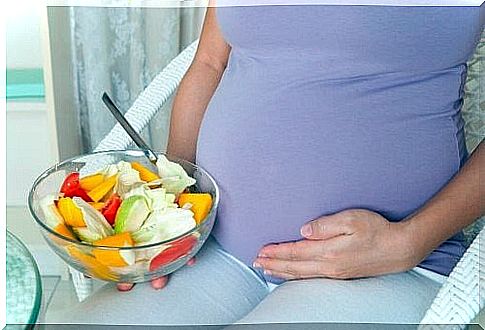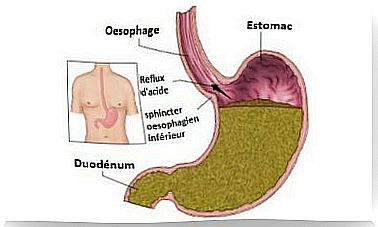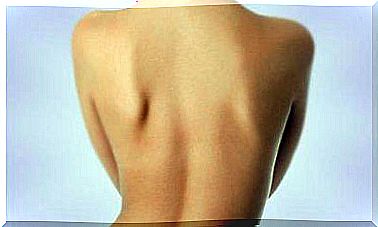Some Advice On Nutrition During The First Months Of Pregnancy
Appropriate nutrition during the first months of pregnancy guarantees optimal nutrition for both mother and fetus. Discover in this article the basic dietary principles during pregnancy.

Adopting an appropriate diet during the first months of pregnancy is crucial for the new baby. Nutrition is one of the main keys for the development of fetal organs to develop favorably.
There are many myths about diet during pregnancy that lead pregnant women to make poor food choices. While it’s true that calorie needs increase, that doesn’t mean you have to “eat for two” and go overboard.
As with other healthy diets, it’s about choosing quality foods that provide the energy and nutrients that a pregnant woman needs during this stage.
Taking this into account not only avoids possible complications for the health of the mother and the fetus, but also prevents various annoyances characteristic of pregnancy, such as the feeling of fatigue, nausea and constipation.
Are you wondering what are the basic dietary principles to take into account during the first months of pregnancy? Want to know which foods are the most recommended? We have listed the most important aspects here, in order to dispel all your doubts.
Why is it so important to adopt a special diet during the first months of pregnancy?

Pregnant women need to be aware of the role that nutrition plays in the development of their babies. This step obliges to take into account certain special nutritional needs which interfere as much with the health of the fetus as with the changes from which the organism suffers.
It is therefore fundamental to adopt a nutrition plan during the first months of pregnancy, and to take into account the following basic principle: a pregnant woman must consume more calories (approximately 150 calories more per day), as well as an extra dose of nutrients, including a dose of folic acid and iron.
It is not good to cut out meals, nor to eat for two: although these two extremes have always existed, it is essential to balance meals by preparing reasonable portions with the right caloric content.
Some tips for adopting an appropriate diet during the first months of pregnancy
Now that you know that it is important to take more care of your diet during the first months of pregnancy, the next step is to know the basics of proper nutrition, which must meet new nutritional needs.
Vary foods
One of the pillars of any balanced diet is to eat a variety of foods that meet all of the body’s nutritional needs. During pregnancy, it is essential to increase the consumption of the following nutrients:
- fatty acids
- the proteins
- the iron
- calcium
- folic acid
Usually all food groups can be included in the diet, but in good combinations. For example, eat fewer carbohydrates, and opt for larger portions of vegetables and fruits.
The recommended foods are:
- whole grains
- fresh fruits and vegetables
- low fat dairy products
- lean meats
- fatty fish
- dried fruits and seeds
To drink a lot
During pregnancy, it is important to drink enough healthy fluids. Water takes part in the functions of the main organs of the body, as well as in the process of formation of the fetus.
Drinking a good amount of fluids per day helps to maintain the feeling of energy and avoids some typical problems associated with pregnancy such as constipation or fluid retention.
The ideal is to consume between 8 and 10 glasses of water per day. You can very well opt for infusions.
Eat regularly

Fasting or skipping any of the main meals can be very dangerous during the first months of pregnancy. Moreover, it is not recommended to do it during the whole pregnancy, as well as during the breastfeeding period.
It is recommended to eat smaller portions but more often, 5-6 times a day. During pregnancy, the three main meals are always essential, and snacks between meals are also essential.
Each dish should have a higher caloric intake but without going overboard. The ideal is to consume 200 more calories per day than the usual recommended amount.
Consume food supplements in vitamins and minerals
During pregnancy, the need for vitamins and minerals changes: although many nutrients are obtained with a good diet, it is sometimes necessary to use dietary supplements to absorb the necessary amount of certain nutrients.
During the first months of pregnancy:
- nutritional calcium requirements drop from 1000 mg to 1200 mg
- the amount of folic acid required is increased from 170 micrograms to 400 micrograms
- iron requirements increase considerably, which is why it is necessary to consult a doctor so that he prescribes you the necessary dose according to your case.
Is nutrition during the first months of pregnancy a subject that concerns you?
In addition to putting into practice the given recommendations, keep in mind that you should not drink alcoholic beverages, and that you should avoid consuming saturated fat as well as irritating foods.
The menu may vary depending on your needs. If you have a pregnancy-related health problem, or if you still have doubts, consult a nutritionist.









